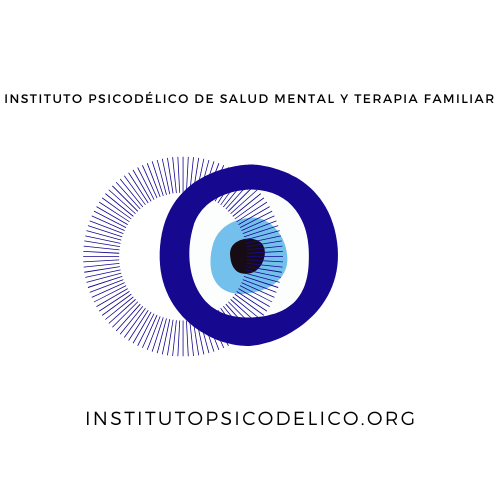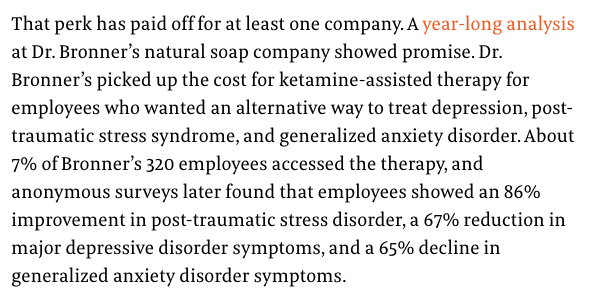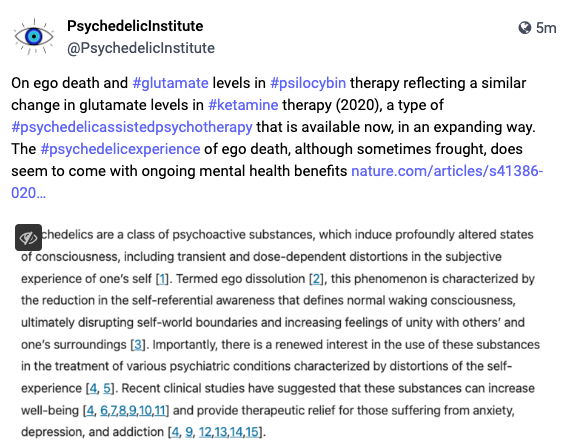
Psicoterapia Asistida con Ketamina & Apoyo
Apoyo más allá del goteo para beneficios más allá del viaje
Más de 60 años de investigación con ketamina respaldan los beneficios de la ketamina en distintos grupos etarios y en varios contextos, demostrando que es una opción segura, eficaz y replicable en el tratamiento de varios trastornos de salud mental, especialmente cuando se la combina con terapia cognitivo-conductual.
La ketamina es un medicamento genérico que puede ser más accesible económicamente que otras formas de tratamiento.
Se ha usado en humanos y animales como anestésico disociativo, como medicamento para aliviar el dolor y en altas dosis para sedación; se aprobó en 1970. Se sabe que provoca una experiencia psicodélica importante.
Podría recetarse “off-label” por profesionales médicos especializados en el uso de dosis sub-anestésicas para salud mental y manejo del dolor, en colaboración con un proveedor de salud mental especializado en psicoterapia asistida con psicodélicos.
Lo que involucra
Terapia cognitivo-conductual psicodélica (centrada en ketamina, contexto y competencias en “psicoterapia asistida”)
Guía práctica para la terapia con ketamina psicodélica.
Aspectos importantes para tener en cuenta
La psicoterapia asistida con ketamina puede ser prescrita por un profesional médico capacitado y referida a un practicante de salud mental psicodélica u otro tipo de profesionales que trabajen cuerpo, mente, corazón y espíritu, de forma coherente con tu experiencia.
Se busca integrar las experiencias psicodélicas para mejorar la salud mental y el bienestar en la vida cotidiana, con un enfoque biológico, psicológico, social y espiritual.
Lo ideal es encontrar la menor dosis de medicamento necesaria para lograr la mayor mejora en tu calidad de vida. El profesional decidirá el entorno —por ejemplo, si es en oficina con supervisión médica, o en tu propia casa con alguien presente que esté sobrio.
Costos orientativos (Estados Unidos)
Sesión IV de ketamina (~40 minutos): entre US$ 500‑1500, no cubierto por seguro.
Psicoterapia asistida con ketamina racémica sublingual + apoyo psicoterapéutico (~18 horas): US$ 3150. Incluye preparación, sesiones de medicina, integración.
Qué hace este Instituto
Propiciar marcos éticos, clínicos y legales para que, en el futuro, el uso terapéutico de psicodélicos esté regulado, seguro y accesible dentro del sistema de salud mental uruguayo.
Educar, informar y preparar a profesionales de la salud, terapeutas, investigadores y ciudadanos mediante espacios de formación, acompañamiento y comunidad clínica.
Ofrecer estrategias de reducción de riesgos a personas que eligen experimentar con estas sustancias en contextos personales o tradicionales, priorizando la seguridad, la salud mental y el bienestar socio‑psicológico.
Impulsar y apoyar estudios clínicos, propuestas piloto y proyectos interdisciplinarios, con transparencia y colaboración, alineados con los avances en legislación nacional e internacional.

Psicoterapia asistida con ketamina ofrece resultados duraderos y efectivos en el tratamiento de depresión, ansiedad y trastorno de estrés postraumático a 3 y 6 meses: hallazgos de un gran estudio retrospectivo de efectividad

Tratamiento de ketamina en casa con apoyo por telemedicina para la depresión: hallazgos de un análisis longitudinal, de aprendizaje automático y de redes de síntomas con datos del mundo real
(Mathai et al., 2024)
La ketamina se utiliza para tratar muchas condiciones en la población general que también son comúnmente abordadas por los equipos de cuidados paliativos, incluyendo la depresión, el dolor agudo y crónico, y los trastornos por consumo de sustancias.
Ramm, Rebecca, Michael Wiisanen y Michael DeMarco. «Ketamina». En Psychedelics in Palliative Care, editado por Marcia Glass. Nueva York: Oxford Academic, 2025. Edición en línea, 1 de mayo de 2025. Disponible en: https://doi.org/10.1093/med/9780197760864.003.0005

Considerando la Ketamina
La psicoterapia asistida con ketamina puede ser recetada por un profesional médico capacitado y derivada a un/a terapeuta especializado/a en salud mental psicodélica, o a otros tipos de profesionales que trabajen con el cuerpo, la mente, el corazón y el espíritu, de una forma que tenga sentido para vos y tu experiencia personal.
Aprender a integrar las experiencias psicodélicas para mejorar la salud mental y el bienestar en la vida cotidiana es el objetivo central de la psicoterapia asistida con psicodélicos. Este enfoque busca llevar estas experiencias transformadoras a más personas, desde una mirada biopsicosocial y espiritual.
De la rutina al ritual
Las rutinas te mantienen con vida... hasta que se vuelven un pozo del que no podés salir.
Los rituales de introspección y de viaje hacia adentro pueden abrir caminos de transformación, sobre todo cuando están acompañados de cuidado informado y apoyo comunitario.
Acercarse a este tipo de trabajo con medicina desde la intención clara, el filtro adecuado, la aprobación médica y un apoyo clínico y social integral, es la forma en que buscamos aprovechar al máximo los beneficios de esta herramienta para todas aquellas personas que aún no encontraron alivio con otras formas de tratamiento.
Menos es más
Encontrar la menor cantidad de medicina y la dosis justa que necesitás para lograr la mayor mejora en tu calidad de vida es fundamental.
Será tu profesional médico quien defina en qué contexto se va a realizar tu proceso con esta medicina:
— Puede ser en un consultorio, con monitoreo clínico,
— o en tu casa, en tu propia cama, acompañado/a por una persona sobria de tu confianza.
La preparación y la integración se ofrecen tanto de forma presencial como por telemedicina, para que puedas contar con apoyo antes y después de cada experiencia.
Capacitaciones prácticas supervisadas
Ofrecemos entrenamientos prácticos supervisados para:
acompañantes espirituales (chaplains),
terapeutas de ketamina,
"sitters" o acompañantes de sesiones,
profesionales de cuidados paliativos,
personal médico,
y practicantes chamánicos.
Estos entrenamientos incluyen entre 6 y 12 experiencias con medicina, y cuentan con opciones de becas y programas de trabajo-estudio disponibles.
Más allá de la vía de administración: el acompañamiento importa
En muchos casos, no se trata tanto de cómo se administra la ketamina, sino del nivel de apoyo que necesitás o deseás, en función del enfoque que tu profesional médico —habilitado legalmente— haya recetado para vos, ya sea con una versión de marca o genérica que llegue a tu cuerpo.
En dosis muy bajas, sus efectos son sub-perceptuales.
En dosis moderadas, se usa en terapia psicolítica, donde estás en comunicación activa con un/a terapeuta durante la sesión.
En dosis dentro del rango sub-anestésico, las personas reportan experiencias muy variadas: desde lo aterradorhasta lo místico.
Cuando estas experiencias están bien preparadas, acompañadas e integradas, pueden generar un cambio significativo en tu calidad de vida.
Este tipo de experiencias no son nuevas. Han existido a lo largo de la historia, en distintas culturas y con diferentes medicinas y prácticas. Pero, en general, no ocurren sin algún tipo de marco de contención o sabiduría.
Una forma de acompañamiento es a través de psicoterapeutas formados en psicoterapia asistida con psicodélicos.
(Otra forma —aunque normalmente no con ketamina— es el trabajo con curanderos, taitas, sangomas y otros/as practicantes tradicionales o culturales.)


TE AYUDAMOS A SUPERAR TU ADICCIÓN
SMART Recovery® (Self-Management And Recovery Training) significa:
Entrenamiento de Autogestión y Recuperación
















